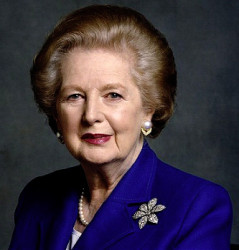LONDON (Reuters) – A quarter of a century since Margaret Thatcher was deposed by her own party, Britain’s ‘Iron Lady’ has stirred a row: Would the hero of Prime Minister David Cameron’s Conser-vative party have voted to leave the European Union?

Thatcher, who died in 2013, grappled with Britain’s EU relationship, supporting membership while in power but also scolding Brussels with a ferocity which ultimately triggered the party coup which ended her premiership in 1990.
When former foreign policy aide Charles Powell suggested Thatcher would have supported the essence of Cameron’s EU deal and voted for membership in a referendum likely in June, he prompted an angry response from many other Thatcher fans.
“It must be a new low for the stay in campaign when they turn to the dead to support them,” said Conservative lawmaker John Redwood who once worked as Thatcher’s chief policy adviser.
“I find it disappointing that Lord Powell should presume to be able to communicate with the dead and tell us what they are thinking,” said Redwood, who opposes EU membership.
Beyond the sensitivities of enrolling a deceased leader into a political campaign, the intensity of the row illustrates both the depth of feeling in Cameron’s party as well as the ambiguity of Thatcher’s own legacy.
In a vote that both supporters and opponents agree will shape Britain’s 21st century fate, both sides are invoking the authority of both Thatcher and her hero Winston Churchill to support their cases.





